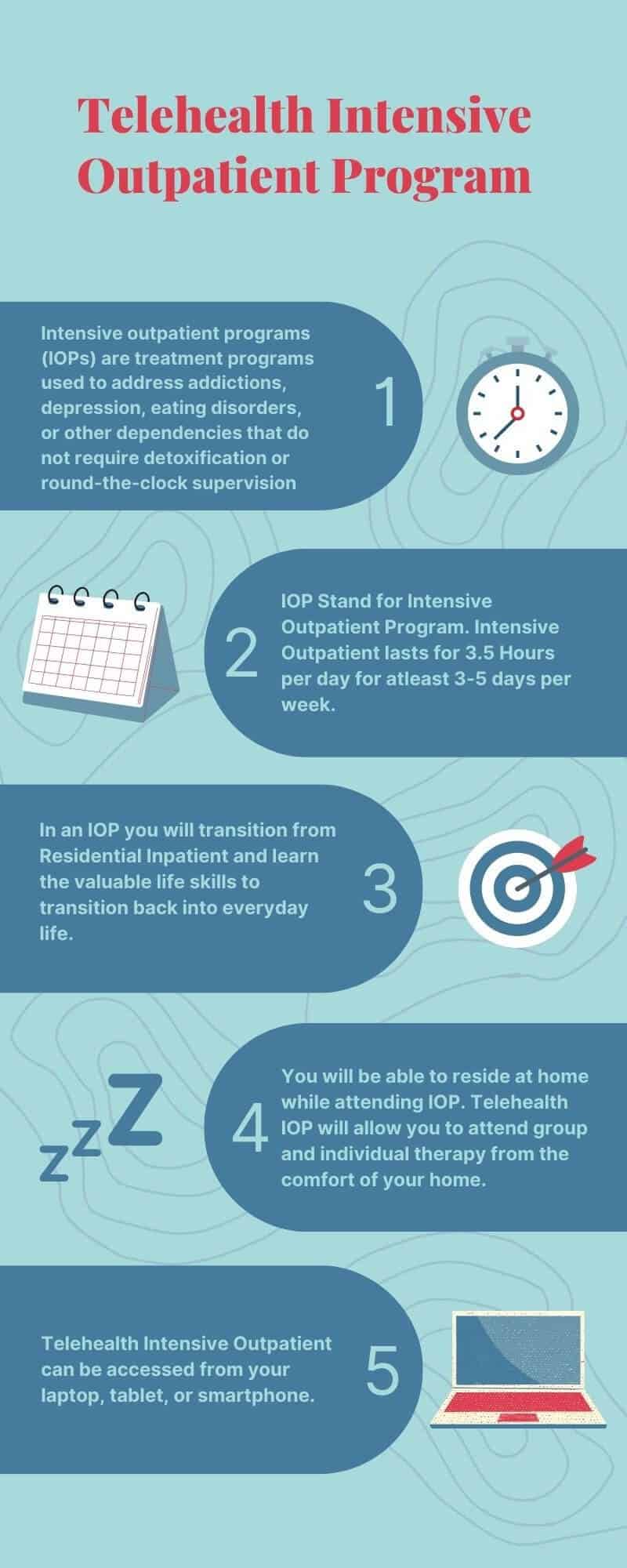The Benefits of Intensive Outpatient Program (IOP) for Long-Term Wellness.
The Benefits of Intensive Outpatient Program (IOP) for Long-Term Wellness.
Blog Article
Browsing the Intricacies of Dual Medical Diagnosis Treatment Within an Extensive Outpatient Program Setting
In the world of mental health and wellness and dependency treatment, the crossway of double diagnosis provides a nuanced obstacle that requires an extensive and customized approach. Within the confines of an Extensive Outpatient Program (IOP) setup, the complexities of resolving co-occurring mental health and wellness problems and substance make use of disorders need a fragile balance of expertise and resources to browse. The combination of evidence-based techniques, collaborative efforts among multidisciplinary groups, and an eager understanding of the distinct needs of each individual are essential components in efficiently managing twin diagnosis within an IOP structure. By checking out the details of dual diagnosis therapy within this extensive outpatient context, a clearer path arises towards holistic and lasting recovery for those grappling with these intertwined obstacles.
Twin Medical Diagnosis Introduction

Recognizing dual medical diagnosis is essential as it requires a comprehensive and integrated approach to therapy. By recognizing the interaction between compound use and mental health and wellness, doctor can customize interventions to satisfy the one-of-a-kind demands of each individual. This all natural strategy not just addresses signs but additionally targets underlying elements that add to the twin medical diagnosis.
In addition, unattended twin medical diagnosis can cause a cycle of relapse and getting worse mental health and wellness signs and symptoms. By identifying the complexity of dual diagnosis and supplying customized treatment, health care experts can support individuals in attaining long-lasting recuperation and improved mental health.
Tailored Treatment Strategies
Acknowledging the detailed interaction between substance usage disorders and psychological health and wellness problems, the growth of tailored therapy plans is paramount in addressing the complexities of twin diagnosis in mental wellness treatment. Tailored therapy plans are customized methods that take into consideration the one-of-a-kind demands, difficulties, and goals of individuals facing dual diagnosis. These strategies are made collaboratively by a multidisciplinary group of experts, consisting of psychoanalysts, psychologists, social workers, and dependency specialists, to ensure extensive and integrated treatment.
Tailored treatment plans normally entail a mix of therapies, medications, and behavior treatments that target both the substance use condition and the psychological health condition concurrently. These plans may include cognitive-behavioral treatment, dialectical behavior modification, medication-assisted therapy, individual therapy, group therapy, and family treatment, to name a few evidence-based interventions. By tailoring treatment techniques to private scenarios, customized strategies can resolve the source of dual medical diagnosis, promote lasting recuperation, and boost total lifestyle for people struggling with co-occurring conditions.
Integrated Care Technique
An integrated treatment approach in double medical diagnosis treatment integrates medical, emotional, and social treatments to attend to the complicated requirements of individuals with co-occurring material usage disorders and psychological health problems. This technique identifies that treating one element of a double medical view it now diagnosis without resolving the other can cause inadequate outcomes. By incorporating clinical treatments such as medication management for mental wellness conditions with mental treatments like cognitive-behavioral treatment for compound usage disorders, individuals receive comprehensive care that targets all facets of their twin medical diagnosis.
Furthermore, the social facet of integrated treatment involves resolving environmental factors that might add to the development or perpetuation important use and mental wellness concerns. This can consist of family members characteristics, real estate instability, or absence of social support. By integrating social interventions like family members therapy, employment support, and community sources, the treatment becomes extra all natural and tailored to the person's details requirements. Generally, an incorporated treatment technique in double diagnosis treatment within an extensive outpatient program setting aims to supply thorough, effective, and customized like individuals dealing with co-occurring problems.
Challenges in IOP Establishing
In the context of double diagnosis therapy within an intensive outpatient program, navigating the intricacies of co-occurring substance usage conditions and mental wellness problems offers considerable difficulties. Among the primary obstacles in the IOP setting is the sychronisation of treatment in between mental health experts and material misuse professionals to ensure a comprehensive treatment approach. This needs effective communication, partnership, and a deep understanding of how these problems interact and affect each other.

Additionally, addressing preconception and resistance to therapy within the IOP setting can hamper development. Some individuals may be hesitant to reveal their double medical diagnosis or might really feel ashamed, impeding their involvement in the healing process. Getting over these obstacles requires a supportive and non-judgmental atmosphere that promotes trust fund and visibility.

Collaborative Professional Efforts
Effective twin diagnosis treatment in an extensive outpatient program demands seamless cooperation amongst psychological health and wellness specialists and substance abuse professionals to guarantee a thorough and incorporated approach to care (Intensive Outpatient Program (IOP)). This cooperation is crucial to resolve the complicated interplay in between psychological health and wellness conditions and substance abuse, as both facets require to be dealt with simultaneously for effective results. Psychological wellness specialists bring know-how in identifying and dealing with mental health problems, while chemical abuse professionals have specialized expertise in addressing dependency issues. my sources By functioning with each other, these professionals can produce customized therapy strategies that satisfy the special needs of each client, taking into consideration both their psychological health and wellness and compound misuse obstacles.
Collective initiatives additionally prolong to routine communication and information sharing among group members to make certain a natural treatment strategy. Ultimately, a joined front of professionals functioning together improves the effectiveness of dual medical diagnosis therapy within an extensive outpatient program.
Final Thought
To conclude, effective dual diagnosis treatment within an extensive outpatient program setup needs tailored treatment plans and an integrated treatment strategy. Challenges may emerge in this setting, but collaborative initiatives among professionals can help browse these intricacies. By addressing the one-of-a-kind demands of individuals with co-occurring psychological wellness and compound use conditions, IOP programs can supply comprehensive and holistic care to sustain healing and total well-being.
Report this page